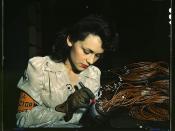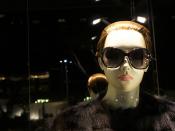Until recently, women poets in Ireland have gotten little recognition, with poetry being dominated for many years by a longstanding male tradition. In a recent interview, Eavan Boland expressed this dilemma, saying, "A young woman in one of my workshops told me if I called myself a poet, people would think I didn't wash my windows" (Hannan 10). For many years it was hard to break through the invisible barrier, one that prevented women poets from receiving recognition. However, Boland argues that she is an Irish poet, who simply happens to be a woman, and all Irish poets should be recognized, regardless of their sex. However, neither Boland's views or poetry make her anti-male. She does not publish poems because of anger or resentment towards men, nor is she against male poets. In fact, Boland has defended and praised male poets. She believes they have "held out their hands generously to women, encouraged them and given them a hearing" (Hannan 11).
Eavan Boland is not against men, nor does her poetry portray an anti-male point of view; instead Boland challenges history and contemporary Irish poetry, which has disproportionately projected a distortion of the truth and a masculine perception.
Eavan Boland first wrote about patriotism, mythical history, folklore, politics, geography and oral tradition, but she eventually broke away from the Romantic tradition. Gradually, her writings have become more about the "ordinary" events in life. Where Seamus Heaney would write about an ancient man who was found in a bog of field in "The Tolland Man," Eavan Boland might link this place to a more personal recollection. Though some people label Boland a staunch feminist and feminists have complained that Boland praises the domestic life too, Boland believes "women writers don't have to be feminists. They just have to...


